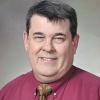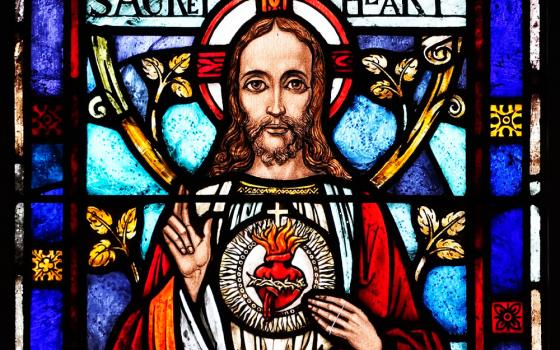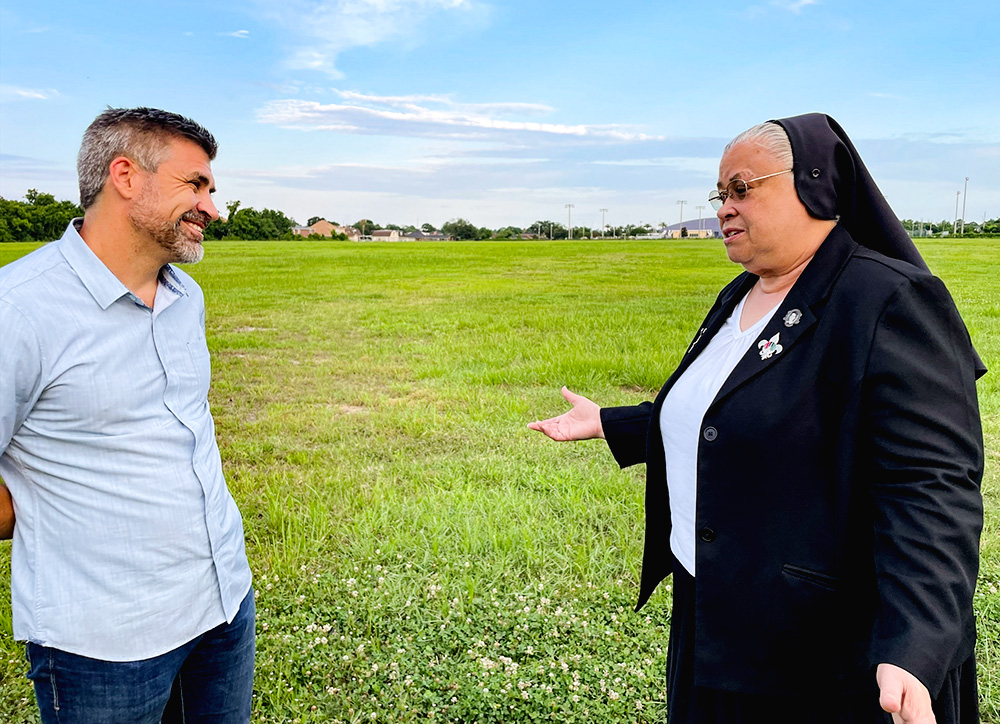
Broderick Bagert, a Together New Orleans organizer, listens to Sr. Alicia Costa, superior of the Sisters of the Holy Family, with the sisters' land designated for the solar field in the background. In the far background is St. Mary's Academy. (Kevin Fitzpatrick)
East of the French Quarter or the Central Business District of New Orleans, drivers on the I-10 encounter a steep bridge crossing the Industrial Canal that connects Lake Pontchartrain to the Mississippi River. I-10 veers left at the bottom of the bridge, then a slight right leads to Chef Menteur ("Big Liar") Highway, a road best known for pill mills, staged accidents with semitrailers, human trafficking and sex work.
It's there you'll also find the property of the Sisters of the Holy Family, which Sr. Alicia Costa, superior of the religious order, describes as "an oasis in the midst of craziness." And the property has recently caught the attention of Pope Francis.
In addition to the motherhouse where the sisters feed people — including sex workers and boxcar sojourners who emerge from the railyard — from their own kitchen seven days a week, plans for a community solar project on the 22 acres offer a new way to support the surrounding community.
"This is part of our mission to help the poor," Costa said. "How do we continue to do that as things are changing through time?"
Costa mused about how, with a reduced and aging population of sisters, they will be able to make use of their enormous property in New Orleans East, which was "just a swamp" when they purchased it in 1906. They moved the motherhouse and St. Mary's Academy there from the French Quarter in the middle of the 20th century.
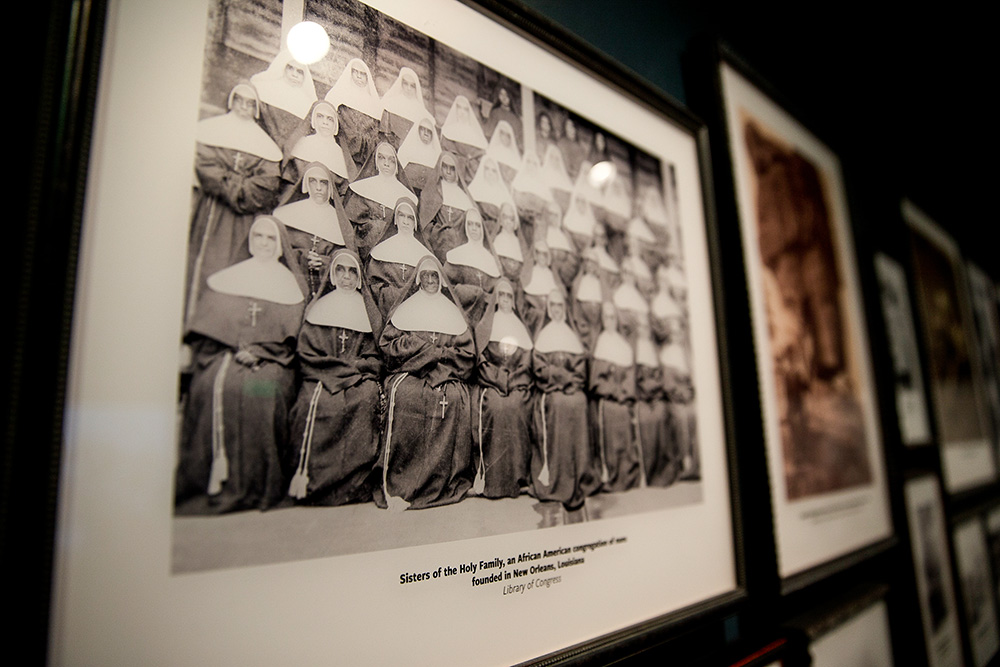
An undated photo of the Sisters of the Holy Family in New Orleans is seen at the National Museum of African American History and Culture in Washington, D.C. (CNS/Tyler Orsburn)
The Sisters of the Holy Family, historically an African American religious community founded by Venerable Mother Henriette Delille, commit themselves to "healing comfort for children, the elderly, the poor and the powerless, especially those of African descent," according to their mission statement. They own and operate an all girls' Catholic high school in New Orleans as well as the oldest nursing home in the United States. Both share the property with the motherhouse.
One night, the sisters saw Together New Orleans — a subsidiary of the Industrial Areas Foundation and a recipient of funding from the Catholic Campaign for Human Development for the past six years — on television and wanted to know more about what the organization had planned in a nearby evangelical church, Household of Faith.
"So we rolled down to Household of Faith to see what they were doing," Costa said, "And we saw Archbishop [Gregory] Aymond on stage, so we knew this must be something important!"
The Together New Orleans meeting brought together faith and civic leaders from across the region to launch the Community Lighthouse Project, which creates resiliency hubs after power outages so that neighbors can go to a nearby church to cool off, store refrigerated medicine, charge their phones or perform other routine activities that require power. Costa and her fellow sisters envisioned a community lighthouse for their property to provide this service to their neighbors when needed.
Community lighthouses are sometimes perceived as a convenience, a way to charge phones or stay cool, but providing access to power can mean life or death for elderly and medically fragile people.
Broderick Bagert, the local Together New Orleans organizer, shared the story of a woman who died in her home a few blocks from the motherhouse after Hurricane Ida because it was dark and she was unable to call 911 since her phone battery had run out of power.
Household of Faith, housed in a former "big box" store, has become one of the largest community lighthouses in the area. Corpus Christi-Epiphany Parish, an African American Catholic Church in the historic Creole Seventh ward of New Orleans, is in the process of becoming a community lighthouse.
The Sisters of the Holy Family and Together New Orleans have a shared interest in addressing the intersection of poverty with care for creation, and the sisters pledged $10,000 to Together New Orleans that afternoon at Household of Faith because they wanted to support the community lighthouse project as a priority.
For them, it was a way of finding purpose, since other forms of direct service for the poor are becoming increasingly difficult as the sisters age.
The donation led to a meeting with Bagert, so they could map out a plan for a community lighthouse on the sisters' property. But as he listened to Costa and her leadership team discuss ways to put their expansive property to use, he realized a Community Solar Project might be a better fit.
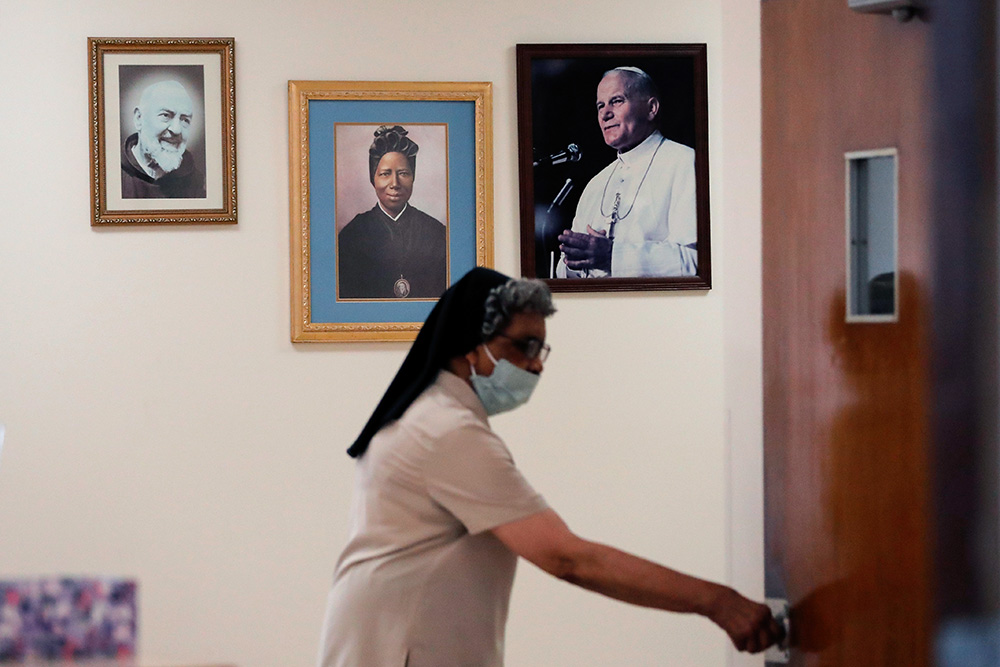
Holy Family Sr. Laurita Oliver walks past portraits of St. Pio of Pietrelcina, human trafficking survivor St. Josephine Bakhita of Sudan, and St. John Paul II during a retreat at the Sisters of the Holy Family Motherhouse in New Orleans in 2020. (AP/Gerald Herbert)
"I didn't have perspective on acreage back then, but now I do! Twenty-two acres is really big!" Bagert said.
The concept of the community solar project is to install solar panels on the grassy, open land along Dwyer Road behind the academy on the sisters' property. Together New Orleans will create a separate nonprofit that will lease the property from the sisters. The estimated $10 million investment would be recuperated through a combination of rebates from the Inflation Reduction Act and subscriptions from neighbors for power generated by the panels that will be fed into the grid and redistributed throughout the area.
Costa described the neighborhood as "very poor to the west, and more middle class to the east." Bagert estimates 350 neighbors will be able to obtain a subscription to the solar grid, which would lower their bills by at least 25% and up to 40% monthly.
The program boosts the return rate on the solar energy by two cents per kilowatt when low-income neighbors subscribe, providing an incentive to include them.
Bagert explained that rates for energy are becoming unaffordable for working-class people or those on fixed incomes. Rather than receiving occasional utility expense relief from service sector agencies, the community solar project will provide ongoing relief from the burden of energy costs.
Not only will the sisters and their neighbors benefit from the community solar project, the local environment will reap benefits as well. The project will reduce an estimated consumption of more than 10,000 tons of carbon per year, or the equivalent of energy consumed by 1,056 average households in a given year.
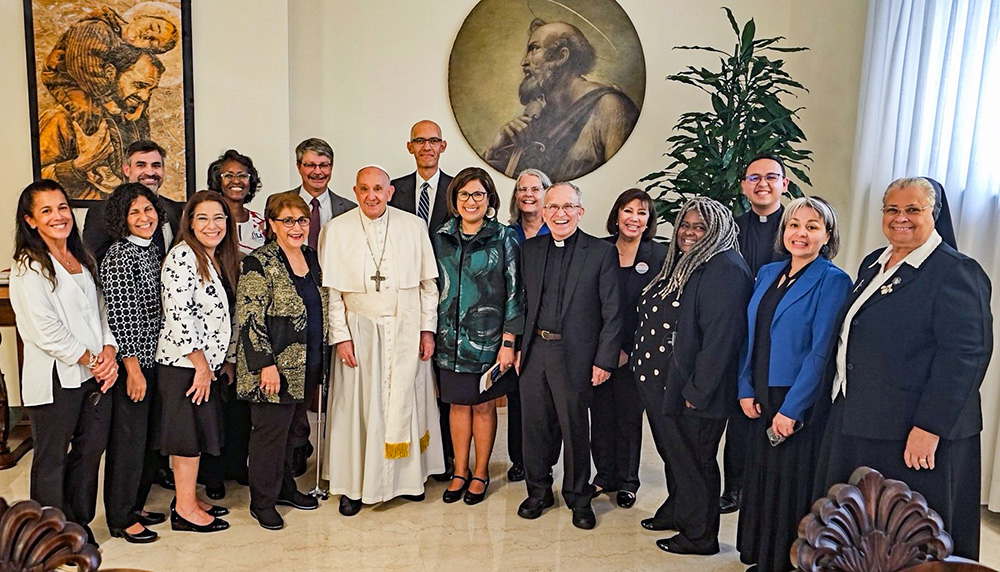
Pope Francis poses for a photo with delegates from U.S. community organizing groups, including Holy Family Sr. Alicia Costa (right), after a private meeting in his Vatican residence, Casa Santa Marta, Sept. 14, 2023. (CNS/Courtesy of West/Southwest Industrial Areas Foundation)
Through the networking of the Industrial Areas Foundation, this project along with others caught the attention of the pope, who invited Costa and Bagert, along with a larger delegation from the Southwest region of the United States, to meet him at the Vatican.
Bagert was surprised how succinctly Francis was able to describe their project.
The group met with the pope on Sept. 14, 2023, not long before the Oct. 4, 2023, release of his apostolic exhortation Laudate Deum, a follow-up to the encyclical on the environment, Laudato Si', which helped set the tone of the meeting. Francis referred to their work as "atomic," meaning "atom by atom" — the building blocks of the change necessary for our environment, and the efforts necessary to relieve the cost burden of energy for low-income people.
The community solar project on the Sisters of the Holy Family's New Orleans property is projected to break ground in early 2025 after completing a few more formal procedures. But there have been significant obstacles to overcome along the way. Bagert described several vested interests in maintaining the status quo.
"The people who these projects are meant to help the most are left out of the conversation," said Bagert.
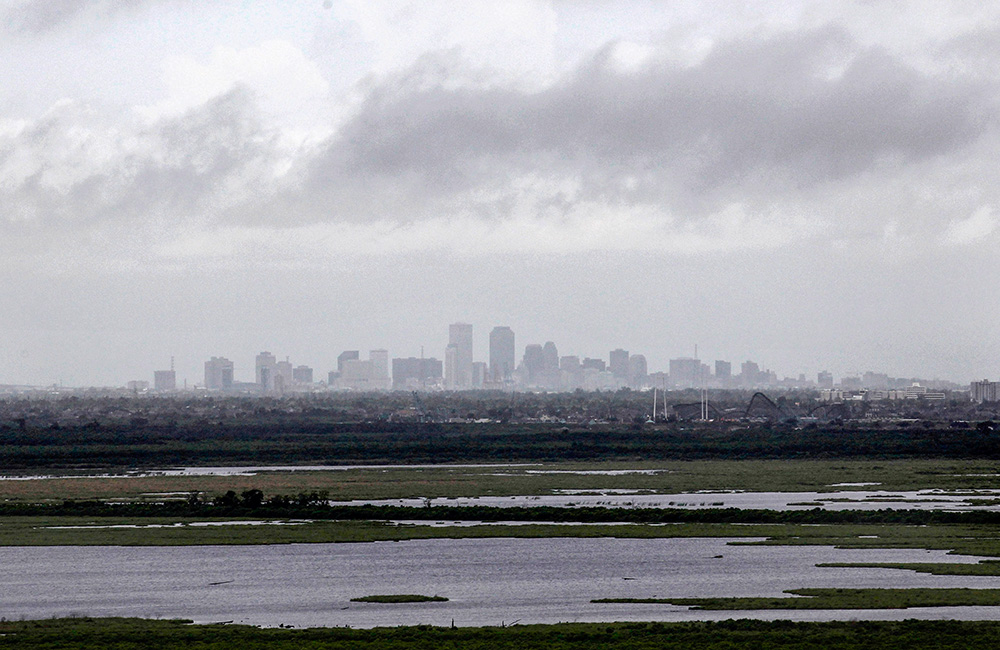
The skyline of New Orleans is seen from Chef Menteur Pass. (AP/Gerald Herbert, file)
City consultants, the energy provider and major industries did not see how they would benefit from this project. Consultants for the city of New Orleans conducted a study in 2018 to determine the viability of community solar projects and an appropriate rate for reimbursement. But their calculations were so low that no one applied, including the Sisters of the Holy Family, who could not envision the low rate of return as financially feasible for them.
So the Sisters of the Holy Family and Together New Orleans met with the local energy provider and members of the city council, "every one of them, all seven," according to Costa, and were finally able to move the city council to vote in October 2023 for a more sustainable rate of reimbursement that would benefit the sisters and their neighbors.
Up until then, according to Bagert, "the program existed on paper, but not a single solar project had been created in New Orleans. We would be a test case. This is the only viable solar project in the South."
Costa spoke effusively about the help of at-large Councilwoman Helena Moreno, who was supportive from the start. Moreno has publicly criticized the local energy provider, directly and on social media, for its poor preparation and recovery after Hurricane Ida in 2021. She has also been a strong advocate for local residents who have been cost-burdened by energy.
Advertisement
In a statement to EarthBeat, Moreno said, "Community solar projects like this one can be a game changer in our city for the potential subscribers — who will see their light bills permanently decreased and it will also help us meet our renewable goals with sizable increases to local renewable production. We believe now is our breakthrough moment to getting as many projects built as possible and have our program finally help our community thrive."
Bagert was quick to say that this project "is not enough. It is part of a deeper engagement strategy. We want to engage and strengthen this entire neighborhood to become more healthy and vibrant. This is more than just one intervention. It creates a lot of hope."
Costa added, "We want to improve community living in this area. We pretty much know all our neighbors."
Bagert said that now that barriers for solar development have been removed, five other solar projects are in the application stage of development. Had it not been for their institutional organizing background, Together New Orleans and the Sisters of the Holy Family would not have been able to surmount the complacency so common to the city.
"Together New Orleans is a blessing," Costa reflected. "They just fell into our lap at the right time!"
